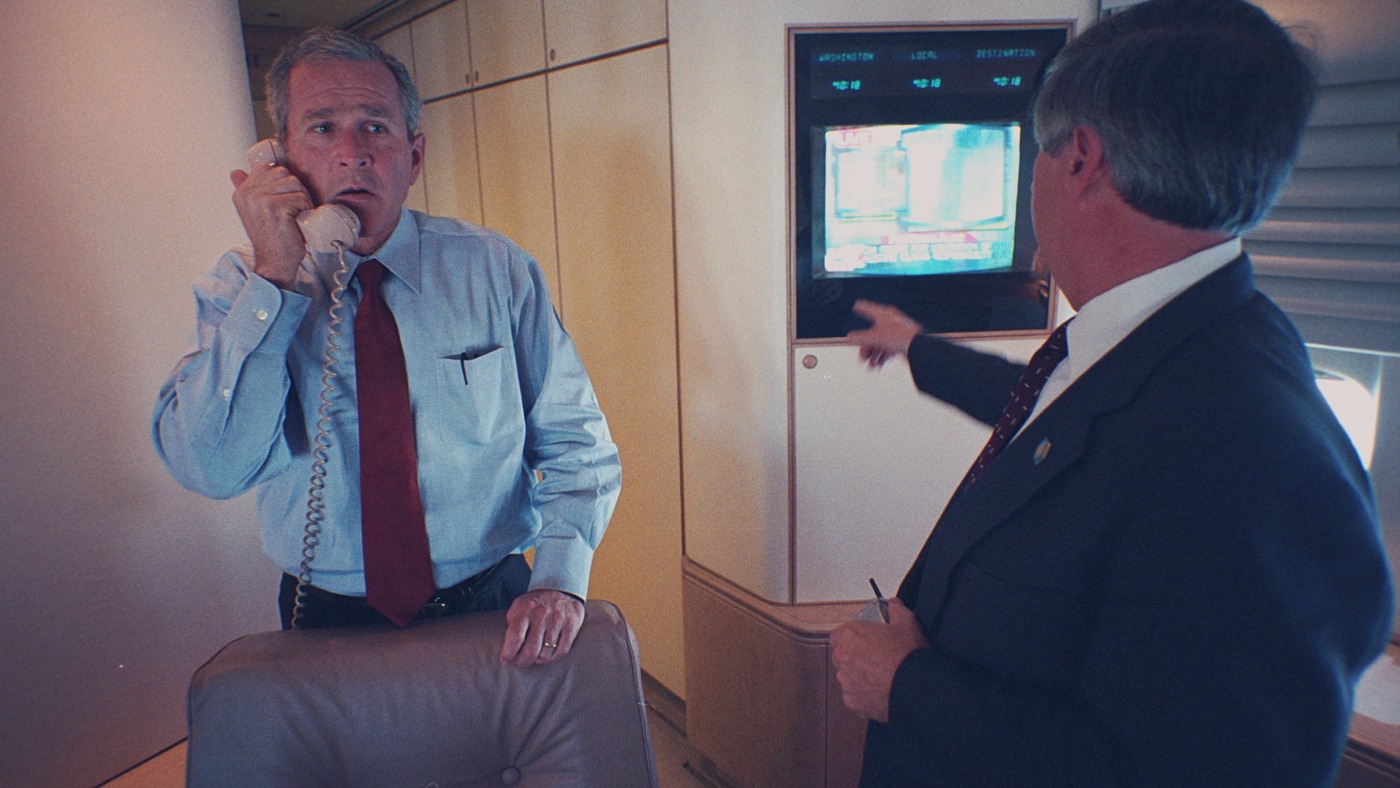‘9/11: Inside the President’s War Room’ review: the much-told story of George Bush
To mark the 20th anniversary of the September attacks, BBC and Apple TV have teamed up to produce 9/11: Inside the President’s War Room, a remarkable documentary detailing the events of that fateful day. If you are looking for a memorialisation of 9/11 or a complete story of the attacks, this isn’t it. Elements of both are included, but they’re only part of the aim of what is one of the best and most revealing 9/11 documentaries.
9/11: Inside the President’s War Room is the story of George Bush and his inner circle’s experience of the attacks. It’s an important story to tell and it’s coming at the right time, but we should be careful of viewing such ‘live’ events as things of the past. Today, as much as ever, in the last 20 years we are experiencing the very real legacy of both 9/11 and Bush/Cheney’s reaction to it.
Just days ago, at time of writing, the Taliban declared the Islamic Emirate of Afghanistan, putting paid to 20 years of American intervention there in the direct wake of 9/11. In Paris earlier this week, the trials of 20 people accused of involvement in the 2015 Bataclan terrorist attacks, which left 130 people dead, began and are expected to last for months as we hear the testimonies of thousands of witnesses.
The emotional ride you undertake through watching this documentary is a turbulent one
From the announcements we hear on trains, to the security we go through at airports or even our own phones, the noxious influence of 9/11 is apparent. This documentary shows both how far we have come since the attacks yet how recent they really were. A lot can happen in 20 years, and after looking at the wrinkled face of George Bush that feels painfully true.
9/11: Inside the President’s War Room is a must-watch mainly because of those who tell the story. The list of interviewees whose recollections form the bulk of the documentary’s narrative is impressive. With the likes of Dick Cheney, Condoleezza Rice, Colin Powell, and Michael Morell, as well as George W. Bush himself, this programme has an unparalleled scope. In weaving their personal anecdotes alongside the telling of the story, a far more complete and even relatable picture of the day is drawn. In many ways this is history as it should be told, allowing those who were at the forefront and at the top to speak in honest fashion about their own experiences of the day, with pictures and archival footage to vividly guide the viewer along. It manages to show us a very human side to these people. Their professionalism and dedication stand out but so do their very human foibles.
Looking back on the attacks now, it’s easy to see them as a monolithic event that happened all at once. In reality, it was spread over many horrific hours. The documentary immerses us into the sickening and graphic tension of that day. In combining recollections from interviews with the archivally documented footage and images of the day, we can witness the many nuances of it. The prayer meetings, the bouts of hysteria and sheer confusion, the painful moments where things simply weren’t known, or where the plane crash was initially dismissed as an accident. The emotional ride you undertake through watching this documentary is a turbulent one. It does not vindicate Bush for his latter actions, but one does – to an extent – understand the anger and emotion in a far more influential way than other documentaries can inspire. We’re given the top-down approach, and we can understand just how much 9/11 meant to those at all levels of US society.
Inside the President’s War Room is a great documentary, not only in the way it tells the story but because of who it uses to tell it
Inside the President’s War Room is a great documentary, not only in the way it tells the story but because of who it uses to tell it. But it’s not a documentary about 9/11 per se. It’s very much the George Bush-9/11 that we are informed about, and it’s George Bush who comes out of it looking like the decisive and action-hero President that he was not.
It’s only towards the end where the tone changes and the much broader impacts of 9/11 are etched out. Bush’s speech to the nation delivered from the White House on that date and his first declaration of the ‘Bush Doctrine’ are covered only in the final moments of the documentary, but it’s in these moments where the real gravity of the attacks perhaps sinks in most for the viewer. 9/11 provided gigantic political dividends for Bush and we would do well to remember that. The impression and story he gave in this documentary was that of the ‘decisive’ president. Though, in reality, he reeled from the disaster just as much as any leader would have. In the aftermath his solution was to seek revenge and thankfully the documentary tells us that without any stars and stripes patriotism.
For many members of Gen-Z, 9/11 feels like an event of the distant past. It’s something we are incredibly aware of, but which has been relegated to the pages of history. We take its very tangible impacts as facts of life – being wary of terrorists, reference to such atrocities, and the fear of that Middle Eastern ‘other’. As part of the 9/11 TV canon we should certainly watch it. But when we think about the heroes of that day Bush, Cheney, and the President’s inner circle shouldn’t be at the top of the list, despite what they tell us in this documentary.

Comments